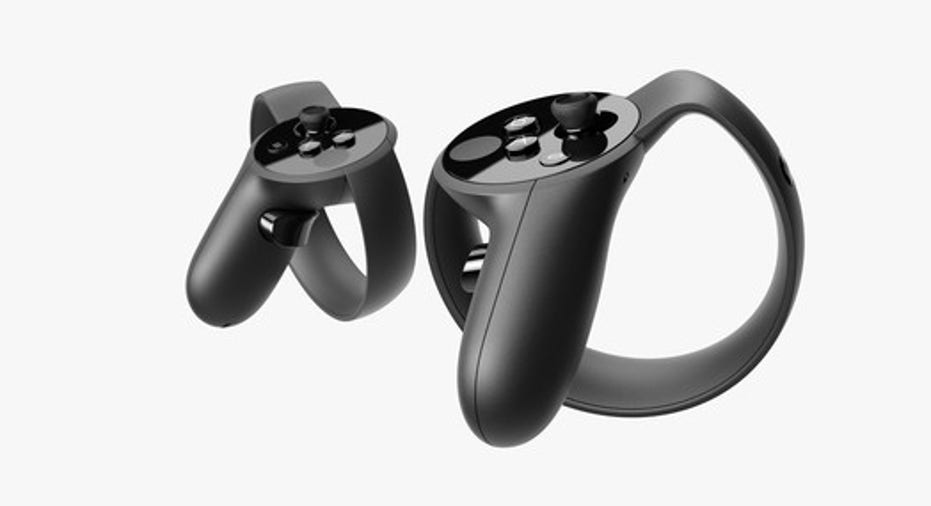2 Things Facebook Could Learn From Sony's VR Success

Oculus Touch controllers cost $200. Image source: Oculus.
The virtual reality (VR) headset market is still in its early innings, but there's already a clear leader so far: Sony (NYSE: SNE). Launched in October, PlayStation VR already appears to be a smashing success. Sony hasn't disclosed official sales figures quite yet, but the company expected to sell several hundred thousand units immediately following its debut. Shortly after launch, CFO Kenichiro Yoshida vaguely said sales were "on track."
Market researcher Canalys just released some new estimates. It expects total unit sales across all VR headsets to top 2 million for 2016, which could climb all the way to 20 million by 2020. The vast majority of those units will be basic VR headsets that are tethered to a gaming console or PC. Canalys believes that PlayStation VR sales will hit 800,000 in the fourth quarter, even as Sony is supply constrained thanks to manufacturing challenges around OLED displays. Because of this shortage, Sony is not marketing the device heavily, but will presumably start advertising it again once inventory conditions improve.
Facebook's(NASDAQ: FB) Oculus is expected to sell 400,000 Rift units this year, which would put it in third place behind HTC's Vive. Rift launched earlier this year, but its Touch controllers only launched last week. Canalys expects the launch of Touch controllers to bolster Facebook in the final weeks of 2016.
There are a couple of easy explanations for Sony's initial success. Let's see how Facebook should incorporate this knowledge.
But at what cost?
The first and most obvious is the price tag. PlayStation VR starts at $400, which doesn't include the requisite PlayStation 4. In contrast, Oculus Rift retails for $600, which doesn't include the requisite gaming PC. For what it's worth, a PlayStation 4 is also a lot cheaper than a gaming PC.
While Oculus is owned by Facebook and has access to greater resources as a result, remember that Oculus is still mostly operating independently -- and like a start-up. Start-ups are by definition inexperienced, and that's particularly punishing when it comes to manufacturing things.
Oculus founder Palmer Luckey confirmed earlier this year that even at $600, Rift is not profitable.
In contrast, Sony says that PlayStation VR is already profitable, even though it costs a whole third less than Rift. As a large and mature consumer electronics company, Sony has extensive relationships with component suppliers combined with decades of experience manufacturing large volumes of gadgets.
More broadly though, it's extremely common for companies to lose money on hardware such as game consoles early on, only to make up for it later with licensing royalties and other services. Plus, costs come down eventually. If Oculus wanted to really get aggressive, it would lower the price to become more competitive and eat the losses in the meantime, letting Facebook absorb the losses while justifying the red ink with higher adoption.
Plug and play
PlayStation VR is also a lot easier to use. Since gaming consoles offer standardized hardware, there's convenience in knowing it just works. PC gaming is a bit more complicated, as systems are often heavily customized and performance varies widely based on these factors. Oculus does list some PCs that are "Oculus Ready," but there's still a plethora of options.
There is likely a subset of consumers that are interested in experiencing VR but may not be willing to buy an expensive gaming PC for that sole purpose. Facebook should consider making a dedicated VR console that would simplify the entire experience and ensure compatibility, delivering the same type of convenience that the PlayStation 4 offers as a dedicated gaming console. This can wait, as VR remains a niche part of gaming, where these concerns don't bother enthusiasts.
But Mark Zuckerberg clearly wants to take VR mainstream, and he'll want to do everything in his power to maximize the odds of success.
Find out why Facebook is one of the 10 best stocks to buy now
Motley Fool co-founders Tom and David Gardner have spent more than a decade beating the market. (In fact, the newsletter they run, Motley Fool Stock Advisor, has tripled the market!*)
Tom and David just revealed their ten top stock picks for investors to buy right now. Facebook is on the list -- but there are nine others you may be overlooking.
Click here to get access to the full list!
*Stock Advisor returns as of November 7, 2016
Evan Niu, CFA owns shares of Facebook. The Motley Fool owns shares of and recommends Facebook. Try any of our Foolish newsletter services free for 30 days. We Fools may not all hold the same opinions, but we all believe that considering a diverse range of insights makes us better investors. The Motley Fool has a disclosure policy.